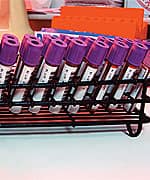Life Extension Magazine®
|
Q: “I’m 68 years old and was experiencing shortness of breath. My cardiologist ordered a BNP blood test. I’ve never heard of it. What is this test, and what is it used for?” A: Your cardiologist ordered the BNP blood test to determine whether your symptoms of dyspnea (difficulty breathing) could be caused by heart failure. What you need to knowHeart failure is most commonly associated with a shortness of breath. The BNP (B-type natriuretic peptide) blood test is the most effective way of determining if your shortness of breath is caused by heart failure. However, confounding factors can lead to BNP results that are difficult to interpret. For example, BNP can be released from the heart’s pressure receptors by anything that causes irritation or an increase of mechanical stress in the heart. Therefore, we stress that readers who are at a higher risk for heart failure are informed about the BNP test and how to interpret the results. Learn more about the BNP blood test, the proper way of diagnosing heart failure, and similar conditions in this article. What Is BNP?BNP is shorthand for brain (or B-type) natriuretic peptide. The name is somewhat misleading, as BNP has nothing to do with the human brain. BNP is a naturally occurring signaling hormone in the blood, and is produced by human heart muscle. Because the molecule was first discovered in the brain tissue of pigs, however, the “brain” term has persisted.
Quite simply, anything that increases mechanical stress in the heart or irritates heart muscle will trigger the heart’s pressure receptors to release BNP into the blood. Increased BNP causes the body’s arteries to dilate (by relaxing blood vessel linings), while reducing blood pressure, blocking adrenalin release, and triggering the kidneys to release sodium and water into the urine. Urinary excretion of sodium, or “natriuresis,” is a protective response that relieves increased blood pressure. BNP thus acts as a safety mechanism to counteract the effects of increased heart muscle stress.1 For this same reason, an enterprising company markets a genetically recombinant form of BNP as an intravenous drug (known as nesiritide, or Natrecor®) to treat heart failure. Causes of Elevated BNPDoctors usually test BNP blood levels to evaluate complaints of breathlessness, chest x-ray abnormalities, edema (excess fluid accumulation, particularly in the legs and ankles), and heart muscle dysfunction, in an effort to determine whether increased heart pressure from heart failure is present.
As you might expect, this can lead to more questions than answers. If just about anything that triggers stress in the heart can cause increased BNP, detecting an elevated BNP level will not tell us why it is high. An increased BNP level does not always signify heart failure, and a physician may need to investigate further to determine its cause. Common reasons for increased BNP levels include:
Increased BNP release by the heart is the body’s way of counteracting these conditions. Administering BNP (as with the drug nesiritide) further raises BNP levels, exaggerating its effects—especially the accelerated clearance of excess water by the kidneys. Interpreting BNP Test Results
Since many factors can elevate BNP, interpreting blood levels of BNP can be complex. Most experts now agree that it is appropriate to use two cut-off values in assessing BNP levels—a lower value that reliably excludes heart failure, and a higher value that accurately confirms heart failure. A BNP value of less than 100 pg/mL essentially rules out heart failure, whereas values greater than 400 pg/mL indicate a 95% likelihood of heart failure. Values between 100 pg/mL and 400 pg/mL warrant further investigation. A suggested “normal” range for BNP is 0.5-30 pg/mL.3,4 Higher BNP levels thus indicate that a more serious disease process is at work, and are less likely to be caused by high blood pressure, lung conditions, and other processes. In effect, the heart experiences higher pressure because of the backup of residual volume in the heart, and BNP blood levels increase. The higher the BNP, the more severe the heart failure, with levels sometimes reaching into the thousands.5 BNP levels in this higher range can signal danger, so your doctor will need to decide whether prompt action is required. The physician will assess whether some other factor may underlie an increased BNP level, such as kidney disease, uncontrolled high blood pressure, or lung issues; or whether increased BNP signals real danger from heart failure and related problems in the near future. Your doctor’s judgment is crucial in determining why BNP is elevated and understanding what is responsible for an increase in the heart’s internal pressure, as well as an appropriate course of action to address the imbalance. High blood pressure is perhaps the most common source of confusion in assessing BNP. If elevated blood pressure is present for a long period (usually several years), the heart muscle grows in thickness (a condition called left ventricular hypertrophy), and internal heart pressure increases (increased left ventricular end-diastolic pressure). This can result in breathlessness, chest pain, and a very convincing—but false—picture of heart failure.
High blood pressure also causes exaggerated sensitivity to anything that causes fluid retention, such as excessive salt intake or certain medications. For example, it is not uncommon for someone with high blood pressure (and accompanying increased heart muscle thickness and pressure) to retain excess water, become breathless, and show increased BNP levels after eating an excessively salty meal. Because the heart is not weak, but actually muscular and strong, this is not truly heart failure—rather just increased heart pressure and tension. Your doctor can distinguish true heart failure—represented by weakness of the heart muscle—from increased heart pressure and muscle thickness caused by chronically high blood pressure, usually with the help of an echocardiogram, a simple test that effectively distinguishes between the two situations.6 Interestingly, the nutritional supplement coenzyme Q10 (at 200 mg daily) has been shown to at least partially reverse excessive heart muscle thickening and high heart pressure.7,8 Other nutrients that may help improve cardiac function include D-ribose, propionyl-L-carnitine, and lipoic acid.9 In summary, breathlessness is an important potential symptom of disease, and one of its most important causes for your doctor to consider is heart failure. Measuring BNP levels may be helpful, and high BNP levels can be diagnostic of heart failure. The BNP level can never be used in isolation, however. To understand its true implications and meaning, BNP level must always be considered within the larger picture of one’s overall health status. Your physician may find the BNP test useful not only for diagnosing potential heart failure, but also in screening for asymptomatic left ventricular dysfunction of the heart, determining level of cardiovascular risk, and monitoring treatment for heart failure. Dr. William Davis is an author, lecturer, and cardiologist practicing in Milwaukee, WI. He is founder of Track Your Plaque, a heart disease-prevention program that shows how to use CT heart scans to control coronary plaque. He can be contacted through www.trackyourplaque.com. |
||||
| References | ||||
|
1. Moe GW. B-type natriuretic peptide in heart failure. Curr Opin Cardiol. 2006 May;21(3):208-14. 2. Doust JA, Glasziou PP, Pietrzak E, Dobson AJ. A systematic review of the diagnostic accuracy of natriuretic peptides for heart failure. Arch Intern Med. 2004 Oct 11;164(18):1978-84. 3. Available at: http://www.medscape.com/viewarticle/480601. Accessed March 14, 2007. 4. Available at: http://qjmed.oxfordjournals.org/cgi/content/full/98/10/765. Accessed March 14, 2007. 5. Battaglia M, Pewsner D, Juni P, et al. Accuracy of B-type natriuretic peptide tests to exclude congestive heart failure: systematic review of test accuracy studies. Arch Intern Med. 2006 May 22;166(10):1073-80. 6. Luchner A, Burnett JC, Jr., Jougasaki M, et al. Evaluation of brain natriuretic peptide as marker of left ventricular dysfunction and hypertrophy in the population. J Hypertens. 2000 Aug;18(8):1121-8. 7. Langsjoen PH, Langsjoen PH, Folkers K. Isolated diastolic dysfunction of the myocardium and its response to CoQ10 treatment. Clin Investig. 1993;71(8 Suppl):S140-4. 8. Langsjoen PH, Langsjoen A, Willis R, Folkers K. Treatment of hypertrophic cardiomyopathy with coenzyme Q10. Mol Aspects Med. 1997;18 SupplS145-51. 9. Kendler BS. Supplemental conditionally essential nutrients in cardiovascular disease therapy. J Cardiovasc Nurs. 2006 Jan-Feb;21(1):9-16. |




